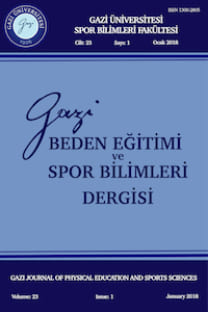SOSYAL PAZARLAMA PENCERESİNDEN TÜRKİYE MİLLİ OLİMPİYAT KOMİTESİ’NİN “SPOR KÜLTÜRÜ VE OLİMPİK EĞİTİM PROJESİ”NE BİR BAKIŞ
Bu araştırmanın amacı, ilköğretim 4-5. sınıf öğrencilerine yönelik interaktif eğitim seminerleri biçiminde yürütülen “Spor Kültürü ve Olimpik Eğitim Projesi”nin sosyal pazarlama planlaması süreci açısından değerlendirilmesidir. Çalışmada nitel araştırma yöntemi kullanılmıştır. Araştırmanın desenini durum çalışması (örnek olay) oluşturmaktadır. Veriler sosyal pazarlama planlaması sürecine göre hazırlanmış açık uçlu sorulardan oluşan görüşme formu ile elde edilmiştir. Soruların anlaşılıp anlaşılmadığı bir pazarlama alanı uzmanı tarafından sınanmıştır. Katılımcıların belirlenmesinde amaçlı örneklem yönteminden yararlanılmıştır. Yüz yüze görüşmenin gerçekleştirildiği üç katılımcıdan biri geçmiş dönemde, ikisi halen görevine devam etmekte olan “Spor Kültürü ve Olimpik Eğitim Projesi”nden sorumlu ve/veya projenin yürütülmesi ile ilgili TMOK Kültür ve Eğitim Komisyonu üyesidir. Görüşmelerde izin alınarak ses kaydı kullanılmıştır. Betimsel analizde özetlenip, yorumlanan veriler içerik analizinde daha derin bir işleme tabi tutulmuşlardır. Kodlama işleminin ardından birbirine benzeyen veriler bir araya getirilerek temalaştırma yoluna gidilmiştir. Araştırmanın geçerliliği ve güvenirliği için araştırmadan elde edilen bulgular ses kaydı ve kısa notlar tutularak farklı veri toplama yöntemleriyle elde edilmiştir. Veri kaynağı olan bireyler isim ve birim bildirilmeden tanımlanmıştır. Araştırma sonuçları interaktif eğitim seminerleri biçiminde yürütülmekte olan “Spor Kültürü ve Olimpik Eğitim Projesi”nin sosyal pazarlama planlaması sürecinin pek çok aşamasını gerçekleştirdiğini ancak bazı noktalarda daha sistematik hareket edilmesine gerek olduğunu göstermektedir
Anahtar Kelimeler:
Sosyal Pazarlama, Spor Kültürü, Olimpik Eğitim, Türkiye Milli Olimpiyat Komitesi
A SOCIAL MARKETING PERSPECTIVE ON THE ‘SPORTS CULTURE AND OLYMPIC EDUCATION PROJECT’ OF TURKISH NATIONAL OLYMPIC COMMITTEE
The aim of this study is to assess the ‘Sports Culture and Olympics Education Project’ which has been implemented in the form of interactive seminars for 4th and 5th graders in terms of social marketing planning process. The method applied in this study was qualitative in nature and the case study was used. Data were collected by the help of the interview form consisting of open-ended questions developed according to social marketing planning process. Clarity of the questions was tested by a marketing expert. Purposeful sampling method was used in order to identify the participants. One of the three participants who were involved in face to face interviews used to manage the ‘Sports Culture and Olympic Education Project’ previously while the other two are either currently in the management of the project and/or NOC of Turkey Culture and Education Commission member, directly related to the implementation of the project. Recordings were used by permission of the participants in the interviews. Summarized data in the descriptive analysis was explored in more detail in the content analysis. After the coding process, similar data were compiled in order to develop the themes. In order to account for validity and reliability of the research, findings were obtained through different data collection methods such as recordings and short memos. Participants who provided the data were described without divulging their names or departments. The results of the study point out that the ‘Sports Culture and Olympic Education Project’ which has been implemented in the form of interactive seminars has been successful in the realization of many of the stages of the social marketing planning process, however there are some areas that need more systematic actions in implementation.
___
- 1. Atalay, M., (2004). Uluslararası Olimpik Akademide Görev Alan Çeşitli Ülke Temsilcilerinin, Dünyada Olimpizm Düşüncesinin Yaygınlaştırılmasına Yönelik Görüşlerinin Analizi ve Türkiye İçin Bir Değerlendirme, Doktora Tezi, Marmara Üniversitesi Sağlık Bilimleri Enstitüsü, İstanbul.
- 2. Black, D.R., Blue, C.L., Kosmoski, K., Coster, D.C. (2000). Social Marketing Developing a Tailored Message for a Physical Activitiy Program, American Journal of Health Behaviour, 24: 323-337.
- 3. Çamlıgüney, F. (2008). 16th International Seminar on Olympic Studies for Post Graduate Students: Olympic Awareness Amongst 9-11 Years Old Children Who Participated or Did Not Participated in Olympic Education Program by Turkish National Olympic Committee, Olympia.
- 4. Chatziefstathiou D. (2007). The History of Marketing an Idea: The Example of Baron Pierre de Couberitn as a Social Marketer, European Sport Management Quarterly, 7(1): 55-80.
- 5. Güzel, P., Özbey S. (2009). Olimpik Eğitim Programlarına Genel Bakış: IOC 46. Uluslararası Genç Katılımcılar Oturumu, International Journal of Human Science, http://www. insanbilimleri.com/ojs/index.php/uib/article/view/731. Erişim tarihi: 25.03.2010
- ISSN: 1300-2805
- Yayın Aralığı: Yılda 4 Sayı
- Başlangıç: 1996
- Yayıncı: Gazi Üniversitesi
